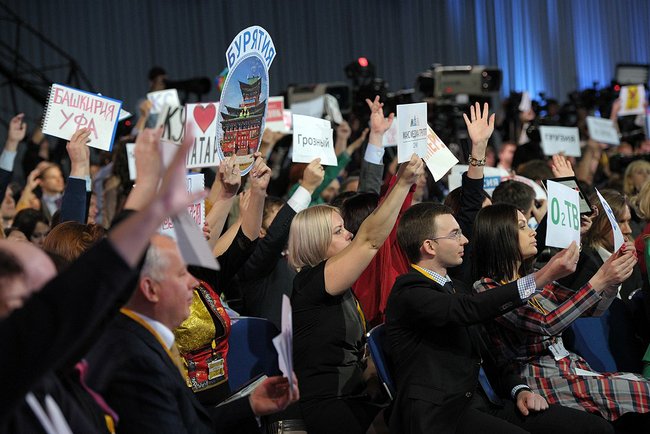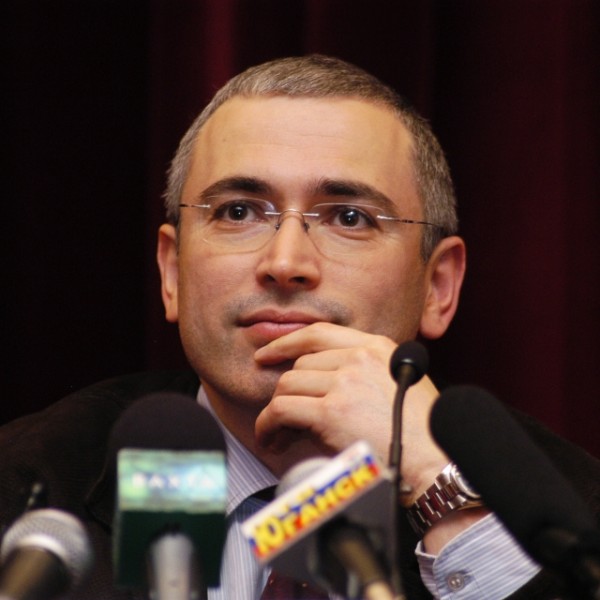
Journalists jockey for Putin's attention during a four-hour press conference. Kremlin.ru.
Over the years President Putin's press conferences have become infamous among Russia's political junkies for their extreme length. His most recent end of the year press conference on December 19, 2013 clocked in at a respectable four hours and five minutes. Putin fielded questions on Edward Snowden (whom he called a “curious person”), on international relations (he named Iran a “priority partner”) and on how Russians should relate to the past (Stalin was no worse a “bloody dictator” than Oliver Cromwell, he explained, and there are many statues to him in the UK). As is also traditional at such conferences, Putin listened to a seemingly endless series of pleas and complaints from regional journalists about infrastructure, corruption and unemployment, which he traditionally promised to ameliorate.
At one point, Putin was asked by Diana Khachatryan of Novaya Gazeta [ru] on the possibility of a rumored “third YUKOS trial.” Another court case involving directors of the defunct oil company has been rumored to be in the works as a means of keeping its former director Mikhail Khodorkovsky, formerly Russia's richest man and political rival to Vladimir Putin, behind bars. Khodorkovsky, whose sentence has already been extended once, has been in prison since 2003 and is set to be freed in 2014. Putin was non-committal, remarking [ru] that though he personally didn't see such a trial as likely, the responsibility ultimately lies with the prosecutors office.

Mikhail Khodorkovsky – Russia's most famous prisoner. Photo CC2.0 Wikimedia Commons.
Strangely, Putin did not take this opportunity to announce what would turn out to be the biggest news of the day — his claim that Khodorkovsky had personally written to him asking for a pardon and that Putin planned to sign it. Instead, Putin waited until the conference was over and mentioned it in passing to a group of journalists. The news that Khodorkovsky had potentially admitted guilt (he has always maintained he is innocent and his detention is politically motivated) and would be imminently released sent the RuNet into a fit of speculation.
Putin explains to journalists that Khodorkovsky has signed a letter asking for a pardon and that he plans to grant it.
Perhaps even stranger than the offhand nature of the announcement was the fact that it even caught Khodorkovsky's lawyers off guard. Russian-American journalist Julia Ioffe tweeted that she had been sitting next to Khodorkovsky's lawyer, Vadim Klyuvgant, when the announcement was made:
Я была рядом с Клювгантом, когда он получил эту новость о своем клиенте. Для него это был таким же сюрпризом, как и для меня.
— Julia Ioffe (@juliaioffe) December 19, 2013
I was next to Klyuvgant, when he got the news about his client. It was as big a surprise to him as it was to me.
However, after the lawyers made public statements saying that they were not aware of any appeal for pardon, the following statement [ru] appeared on Khodorkovsky's official Facebook page:
До встречи Михаила Ходорковского с его адвокатами все ранее данные ими комментарии, касающиеся прошения о помиловании, недействительны.
Until Mikhail Khodorkovsky meets with his lawyers, all of their prior statements concerning his pardon appeal are null and void.
Russian oligarch and former presidential candidate Mikhail Prokhorov, who has lobbied for Khodorkovsky's release for some time, was understandably pleased [ru]:
Главная новость – помилование Ходорковского. Случилось то, что должно было случиться еще несколько лет назад. Я рад за Михаила и его семью
— Михаил Прохоров (@MD_Prokhorov) December 19, 2013
The main news is the pardon of Khodorkovsky. What should have happened years ago has happened. I'm glad for Mikhail and his family.
Sergei Zheleznyak [ru], a Duma Deputy from the ruling United Russia party, was quick to use the pardon as evidence of Putin's clemency, announcing in a self-congratulatory Facebook [ru] post that:
Готовность Президента удовлетворить прошение о помиловании, также, как и широкая амнистия к 20-летию Конституции России, […] подтверждение того, что Россия все больше становится цивилизованным, правовым и социальным государством.
The willingness of the President to fulfill the request for padron, much like the wide amnesty for the 20th anniversary of the Constitution, […] is a confirmation of the fact that Russia is becoming a more and more civilised, law-based and social state.
On the other hand, Vadim Sukhodolsky [ru], a member of the opposition party PARNAS, claimed [ru] the move, much like other amnesties, was purely about PR:
Помилование Ходорковского, как и амнистия активистов Гринпис и части узников Болотной это игра Путина перед Олимпиадой в Сочи для Запада.
— Вадим Суходольский (@sukhodolsky) December 19, 2013
Khodorkovsky's pardon, like the amnesties for the Greenpeace activists and for some of the Bolotnaya prisoners is simply an act Putin is putting on for the West before the Sochi Olympics.
Sergei Korolev [ru], a Moscow-based writer and philosopher, was similarly cynical [ru] about Putin's motives:
Помилование МБХ м.б. связано с пониманием того, что его мать может уйти из жизни, пока сын в тюрьме. Для имиджа ВВП это было бы катастрофой.
— sergei korolev (@s_korolev) December 19, 2013
Khodorkovsky's pardon may be tied to the understanding that his mother may die while her son is still in prison. For Putin's image this would be a catastrophe.
Others were more interested in Khodorkovsky's motives for asking for a pardon than Putin's motives for granting one. Tuva-based journalist and musician Valery Otstavnyk tweeted [ru]:
Вот совершенно глупый вопрос. Если МБХ вправду попросил ВВП о помиловании, чего было ждать 10 лет?
— Валерий Отставных (@otstavnyh) December 19, 2013
OK, here's a really dumb question. If Khodorkovsky really asked Putin for a pardon, then why did he wait for 10 years?
Not everyone was pleased to see Khodorkovsky released. Though public support for Khodorkovsky's release has increased [ru] over his long imprisonment, some still regard him as a member of the widely despised oligarch class, that plunged the country into chaos in the 1990s. One user, who tweets under the name of Human Zoo [ru], was clearly unimpressed [ru] by news of his imminent release:
Считаю, что МБХ и ему подобные, должны гнить на урановых рудниках вместе с Путиным.
— Human Zoo (@IgitDash) December 19, 2013
I think Khodorkovsky and his ilk should rot in the uranium mines along with Putin.







